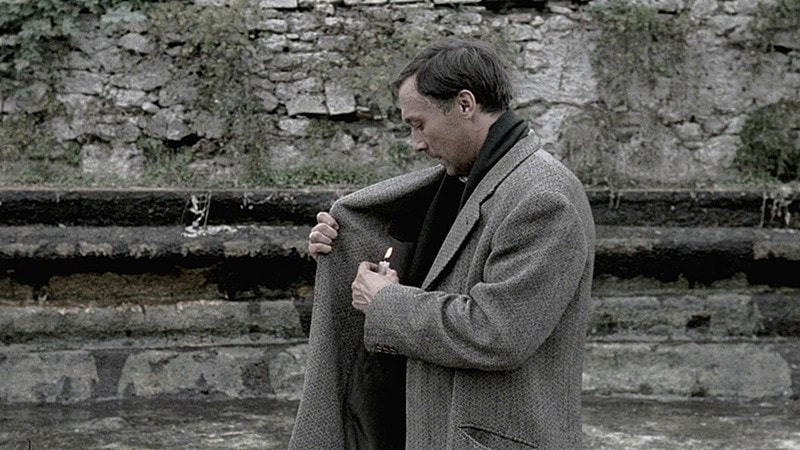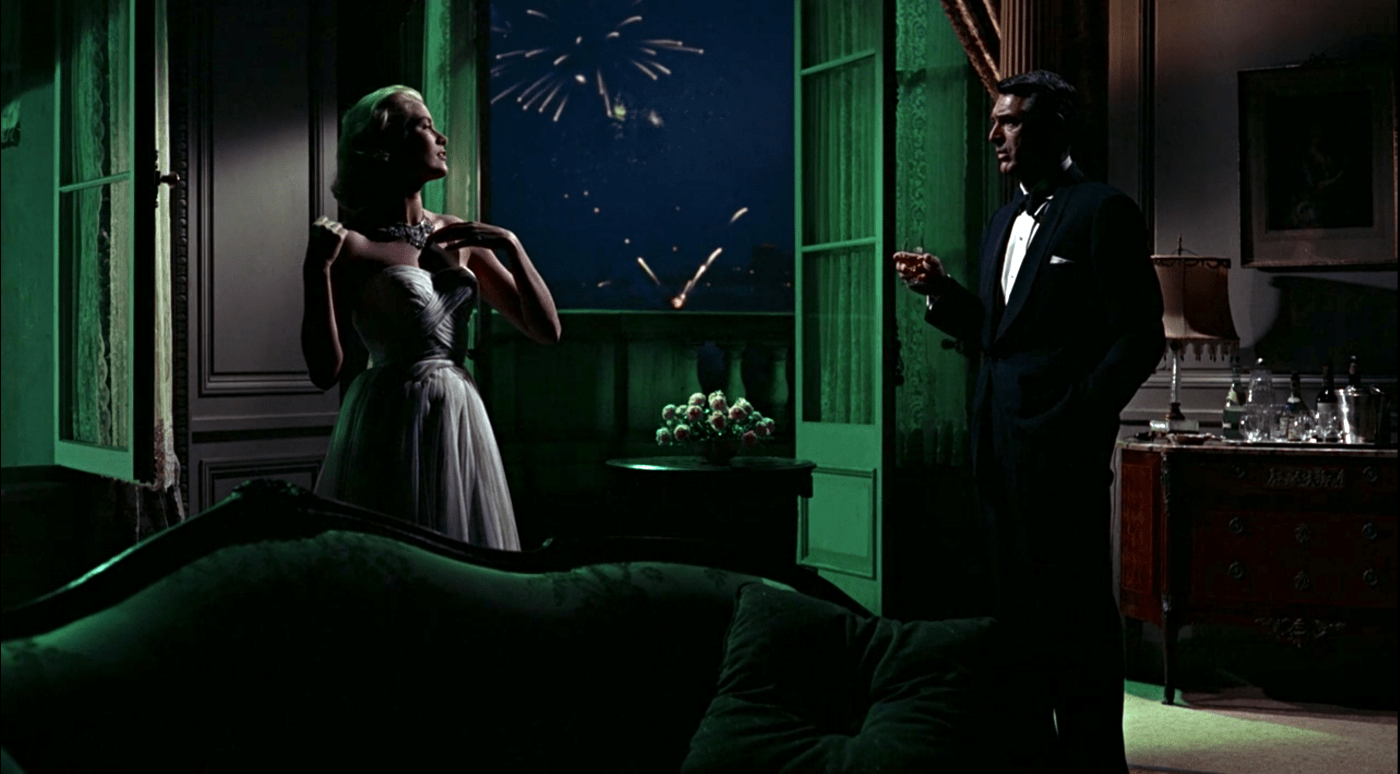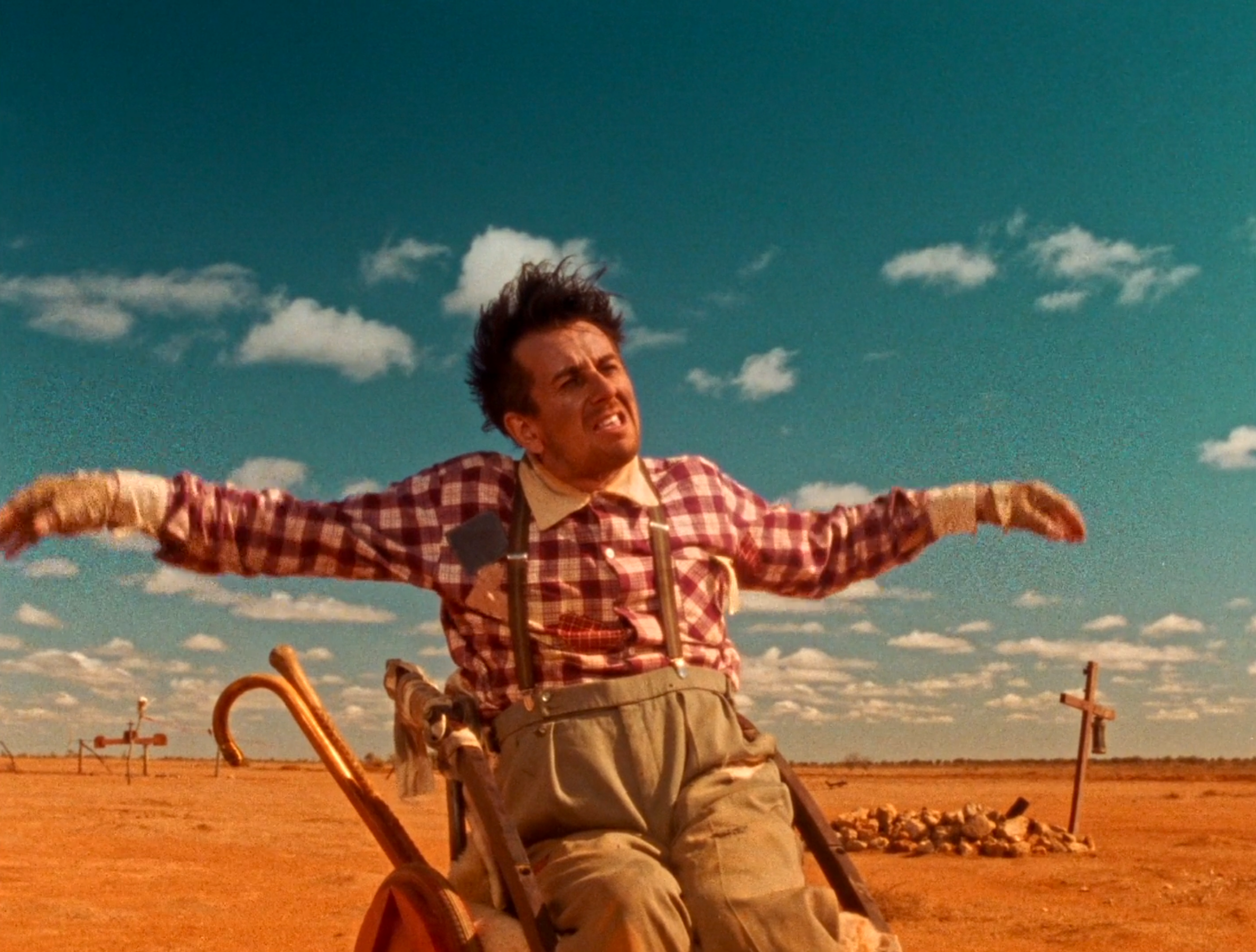
When a film depicts actors playing the role of actors it inherently becomes existential. Peeking behind the curtain calls everything into question. Shakespeare makes many references to this idea, as he does here in The Tempest,
Our revels now are ended. These our actors,
As I foretold you, were all spirits and
Are melted into air, into thin air:
And, like the baseless fabric of this vision,
The cloud-capp’d towers, the gorgeous palaces,
The solemn temples, the great globe itself,
Yea, all which it inherit, shall dissolve
And, like this insubstantial pageant faded,
Leave not a rack behind. We are such stuff
As dreams are made on, and our little life
Is rounded with a sleep question why we It shines a light on what
Watching a film is very much like a dream. We usher into a dark room, we slump into our seats, our breathing slows and our pupils widen as we relax. When it is over and the lights come up it takes a minute to wake up out of the world we have been drawn into. Yorgos Lanthimos’ The Alps blurs the line between acting and real life, between fantasy and reality and in so doing calls into question what we are all doing and why. When we watch an actor act we are watching them fulfill their role, their purpose. Questioning the relationship between an actor and their acting naturally calls into question our own actions and our own purpose.
This theme is present in many films. In some ways it is inherent to any medium that involves acting. The manner in which The Alps addresses these issues is similar to Leos Carax’s Holy Motors which came out in 2012 one year after The Alps. Holy Motors presents a series of vignettes connected only by their having the same leading man. Each story ends with the actor returning to his limousine and taking off whatever make up and costume he has on and changing himself into the next character. We are never given his name and each time we exit a scene we think we are entering reality but we are confounded when we realize that he has just transitioned into the next role.
Carax tricks us over and over into thinking we have found the original, the logos, but all we have discovered is another layer of the onion. In comparison once we discover the premise of The Alps and what this strange band of actors do, we are able, at least for a little while, to tell the difference between fiction and fact. It needs to be said that at its core there is no “fact” in either film. The movies are both fictions, but they both present a fiction within a fiction.

The Alps sensitizes the viewer to all the ways in which acting and the performing of roles exists in our lives. When Lanthimos introduces a dance club where people dance traditional dances like the tango, or the waltz you realize that dancing is a form of acting. The two people have prescribed roles and actions and they perform a scene together. Not only this but the artificial enacting of a formal set of moves can have real emotional effects. Dancing can produce a feeling of intimacy, even empathy. We enjoy our mutual performance.

A character mentions in passing that her friend plays in a cover band and again there is the realization that not only is playing in a band like being an actor, but with the addition of it being a cover band it comes even closer to playing a role. By the time The Alps is over everything begins to feel like a performance, a role we adopt. There is of course a whole field of study pertaining to identity as a performance. The Alps heightens our awareness of this phenomenon by exaggerating the process. The film artificially separates out the performative aspect of our lives so that we can observe it.
In both form and content The Alps has similarities to a Lucriecia Martel film. Martel and Lanthimos have a similar sense of composition. The long aspect ratio allows them to divide up the screen into compartments. Lanthimos pushes his characters to the edges of the frame. If you were to chop this film down to fit on a television many scenes would be empty.
Lanthimos

Martel

Both directors have a way of keeping their distance from their subjects but allowing us intimacy through observation. Its a matter of physical and metaphorical distance. Sometimes it is necessary to “take a step back” in order to digest the meaning behind an interaction. In both films we develop sympathy for the main character, but we see her in context. We see their place in the world they inhabit and can identify with them despite the oddities of their situation or behavior.
Both directors also inject a measure of artificiality that keeps us at a distance, Lanthimos more than Martel. Lanthimos would bring this mannered stiffness to its height six years later in The Killing of A Sacred Deer, where the acting is almost completely bereft of affect and intensely unnerving.
The Alps are a group of actors who replace recently deceased loved ones. The idea is that they will make the grieving process easier by making it more gradual. This is a completely ridiculous premise. Who would ever want such a thing, but it is a contrivance, like a science fiction premise, that enables Lanthimos to explore what it means to act out our identities. The absurdity helps keep us from accepting what we are watching at face value. We are incredulous and so we observe carefully what is transpiring on the screen.
The human ability to imagine what is not there, and to pretend that something is there enabled early humans to do things like hunt prey. You come across a set of tracks in the mud and you can imagine what sort of animal was there. You can imagine the past when the animal walked through and visualize the future where, if you follow the tracks, you catch up to it. Our ability to fantasize is grounded in the practicality of evolution.
As with any of our evolutionary developments we can apply them as we see fit. Fantasy is most demonstrable in children who are not embarrassed by walking down the street dressed as Spiderman or Princess Ariel. Filmmakers like Guillermo del Toro and Hayo Miyazaki recognize that these fantasies are not meaningless whimsy, but serious attempts at working out the way the world functions.

In both Pan’s Labyrinth and Spirited Away we see that the children do not use fantasy as an escape. In fact their fantasy world is more dangerous and frightening than the real world, but because they are fictitious they are safe. You can imagine being devoured by a monster, and scream in agony, while knowing you will emerge unscathed when you are ready. You face your fears, experience the worst possible outcomes, and plot courses toward triumph. It is a mental laboratory of consequences.
If we understand that fantasy and role playing are not just flights of fancy but serious business The Alps’ absurdity seems more understandable. The bereaved characters in the film are unsure how to proceed after their loss. Given an opportunity to find a path forward they accept the services of The Alps Group and hope for the best.
The lonely people of The Alps are primed for fantasy. However even with this understanding, it is still absurd to think that such a service would be wanted. This absurdity is like a magnet that pulls us steadily away from our ordinary observations and challenges us to gauge just how far fetched the film actually is. Lathimos is not trying to convince you that what he presents is plausible but that it might resemble the truth more than you realize.

The Alps actors are meant to set aside their identities and become a blank doll or receptacle into which costumers can insert the identity of their lost loved one. Like the lifeless glass eyes of a doll, the Alps actors are far less life-like and naturalistic than you would want. The Alps actors are not professionals, they have day jobs. They memorize the dialogue given to them and deliver it on cue like a machine.
The real actors in the movie are able to illustrate the difference between the scripted stiffness of their characters’ forced exchanges and the naturalism required to depict the character they play in the film. If that is a confusing sentence it should be.
Just as we have come to accept this contrast everything goes haywire. When the main character, Monte Rosa, is fired her real life suddenly seems bewildering and unmanageable. Even though her real life never came with a script she is desperate to maintain the role she plays where she has one.
Her desperate efforts to jump back into the characters she has been playing illustrate the shift that has taken place. She has moved from being a person acting out a role to a role unable to find a way to be a person. The word actor classifies someone as a fake, a pretender. The word can also refer simply to a person who performs an action. For the actor an action is a fiction, prefabricated by a writer. For person there is no such pre-scripted plan.
Sartre might see this issue as a choice between acceptance of freedom, or, what he termed, “acting in bad faith.” In fear of the absolute freedom we have, and the meaninglessness that underpins it, we act as if there are prescriptions that compel our behavior, as if there is a right way to do things and a wrong way. We end up acting out roles. Each Christmas families gather and try to execute the perfect and correct Christmas. They meticulously construct the mise en scène. They utter the pre-scripted words “Merry Christmas!“ “Have you been a good girl?” “Oh! You’ve grown so much.” They don their costumes and present their happy face.
The scenes the customers of The Alps choose to create seem more like the replaying of memories, than a chance for closure or resolution. Some are painful fights or the moment a wife caught her husband with another woman. We learn about these characters by seeing what they choose to enact or reenact. Lanthimos sets up a premise so pregnant with possibilities it seems there is no end to the ways you can read its content. Once you call into question what is real and what is not you open the door to endless interpretation. The richness only grows when you add a reflexive element that layers the movie with actors acting like actors, and stories being rendered by the characters in the story. Its reminiscent of Krzysztof Kieślowsk’s Camera Buff or Hirokazu Koreeda’s Afterlife where every facet seems like an invitation to free associate and construct some new insight out of what we are presented with.
We all act, the question is the origin of our actions. The origins of our actions determine whether they are actions or acting. It can be difficult to discern the difference. What begins in The Alps as a contrasting duality ends up being more of an amorphous continuum where the purpose of our machinations is unclear.
In Macbeth Shakespeare takes a dim view of it.
“This life, which had been the tomb of his virtue and of his honour, is but a walking shadow; a poor player, that struts and frets his hour upon the stage, and then is heard no more: it is a tale told by an idiot, full of sound and fury, signifying nothing.”

If you enjoyed this article click here for more
www.filmofileshideout.com/archives/yorgos-lanthimos-the-killing-of-a-sacred-deer



